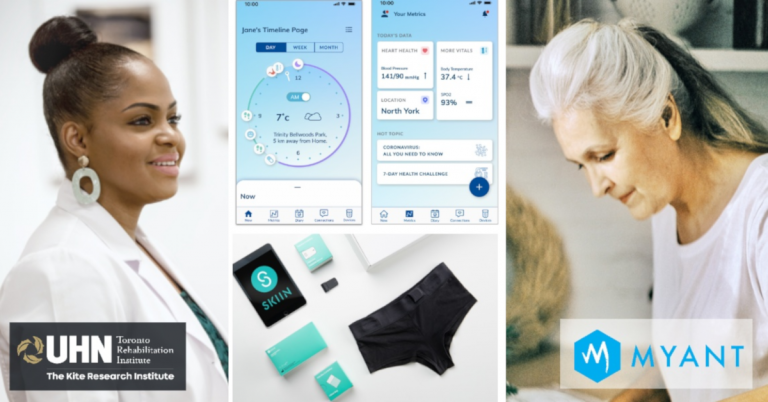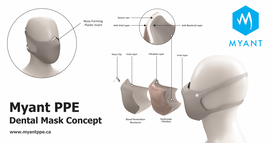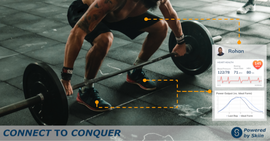Myant and UHN's KITE Research Institute Announce Partnership for the Clinical Validation of Textile Computing Solutions
The partnership aims to validate the efficacy of solutions built on the Myant Platform which use textile garments to assess conditions and deliver therapy to the patient’s body. This new mode of connecting patients to care solves the fundamental challenges of distribution, adoption and diagnosis that have limited the proliferation of telehealth in the past.
TORONTO, ON – June 19, 2020 – Myant Inc., pioneers in textile computing, and KITE Research Institute, the research arm of Toronto Rehabilitation Institute (a member of the University of Health Network), have announced a multiyear co-development partnership that leverages the Myant Platform, the company’s core textile computing technology (commercially known as Skiin), as well as research from KITE and UHN to develop and clinically validate an array of digital diagnostics and digital therapies backed by the Myant Platform. These solutions point to a new mode of care delivery that addresses the fundamental distribution and adoption challenges that limit existing telehealth systems. The solutions--ranging from continuous and holistic remote patient monitoring for cardiac care to telerehabilitation via FES (functional electrical stimulation) for stroke survivors and more--will all be enabled via textile garments that sense and react to the human body and that are connected to the cloud. By collecting data from the human body via clothing and distributing the insights derived via the Myant Platform, the solutions and underlying platform being validated by the KITE-Myant partnership are poised to finally unlock the potential behind telehealth and define the new standard for remote care.
Unlocking the Promise of Telehealth by Addressing Distribution and Adoption

Figure 2: Existing wearables have started to provide a basic biometric baseline, but are not easily adopted by all members of society, particularly the elderly and physically less-abled who struggle with integrating new devices into their lives.
The benefits of digital healthcare have been understood for many years, however the ability to practically transcend distance and improve access to care has not been fully realized. While improvements in digital technologies have enabled patients and healthcare practitioners to converse via secure audio and video communication channels, a significant gap still exists in the care provider’s ability to assess the current and historical physiological state of the patient in the context of their environment, and to ultimately remotely deliver intervention or therapy. What has been lacking was a continuous, bidirectional interface to the patient’s body that allows the caregiver and the care receiver to meaningfully connect even when separated by distance.
Consumer wearable devices like smartwatches and fitness trackers have begun to bridge the gap by providing basic biometric baseline measurements, but the segments of society who would benefit the most from remote care like the elderly often have trouble integrating existing wearables devices into their lives since their daily routines often need to be adjusted around the effective use of the device. This points to the need for a new solution in a form factor already widely adopted by all people with the ability to ambiently assess and deliver therapy, as opposed to wearables that are aimed at the able-bodied and tech-savvy segments of society. Such a solution would effectively redistribute the burden of care, allowing the elderly, those living in remote areas, and less able-bodied individuals in society to live healthier, more independent lives and feel more empowered and cared for.
Canadian Innovators Collaborating to Reimagine Connected Care
Acknowledging this unmet need, the KITE Research Institute--the top ranked research institution dedicated to rehabilitation based in Toronto--has chosen to work with the textile computing pioneers at Myant (also based in Toronto) to develop rehabilitation solutions enabled by textiles that can sense and react to the human body. By knitting sensors and actuators into clothing and connecting these garments to the machine learning enabled Myant Platform, physicians will now be able to access longitudinal biometric data for patients, plus contextual information about their life and activity. The data can be analyzed and flagged on the Myant Platform by machine learning, trained to spot deviations from a specific patient’s baseline, providing more holistic assessments of a patient’s health. In turn, the care provider will have the ability to initiate different types of therapy delivered through textile, and monitor the impact of therapy (for example physical or pharmacological) or lifestyle modifications. The patient can also choose to share their data via the Myant Platform with others in their care circle, including loved ones who may not be physically present to provide care, helping to address the issue of social disconnection - a key social determinant of health. Furthermore, social determinants of health such as education and access to information can be addressed through the platform, providing society with a holistic solution to reimagine the way we care for each other.

Figure 3: Garments powered by Skiin are bidirectional in nature allowing textiles to deliver therapy as well as sense. Functional electrical stimulation (FES) delivered through a garment and remotely managed by a care provider may enable a more effective mode of rehabilitation for stroke survivors and others who have impaired function in their extremities.
The solutions powered by Skiin to be clinically validated as part of this multiyear partnership could include healthcare system level solutions such as virtual triaging and remote patient monitoring for safe discharge, and address a range of diseases and conditions such as cardiovascular disease, sleep apnea, diabetes, recovery from stroke, rehabilitation of musculoskeletal injuries, and much more.
A New Type of Care for a New Normal
The announcement of this partnership comes at an inflection point in society’s attitude towards telehealth, with the COVID-19 crisis highlighting both the promise and the shortcomings of currently available solutions. By clinically validating the efficacy of textile-based monitoring and therapeutic solutions, Myant and the KITE Research Institute hope to usher in a new age in the democratization of care via wearable technology that makes telehealth adoption easier for patients and more useful for care providers.
“I am deeply honored to be working with the innovative minds at the KITE Research Institute, the world’s leading research institution for rehabilitation, to validate the potential of Skiin. This collaboration puts Canada at the forefront of telehealth at a time when the world needs Canadian innovation the most,” said Tony Chahine, founder and CEO of Myant. “By signing this agreement, Myant is putting the final puzzle pieces together to realize our original mission of building an end-to-end solution that connects people to care, to performance, and to each other.”
"This partnership has been growing and evolving for a long time, and I am excited to be taking this next step of commitment. Myant is the global leader in textile computing and I believe that KITE-UHN together with Myant will create immense short- and long-term benefits for Canadians,” said Dr. Milos R. Popovic, Director of the KITE Research Institute. Reflecting on the world class nature of this partnership, he notes that “this union reinforces the importance of fostering innovation here in Canada, as innovation has a way of driving even more innovation."
For more information, please contact:
Frank Florio
VP, Strategy & Business Development at Myant
frank.florio@myant.ca, 416-423-7906 x421
Jarrett Churchill
Senior Advisor, Public Affairs and Communications
KITE Research Institute, University Health Network
Jarrett.Churchill@uhn.ca, 416-320-0147
About Myant Inc.
Myant is a textile technology company devoted to the betterment of life for all people in society. Using textiles that can sense and react to the human body and a platform that enables machine learning driven health and performance outcomes, Myant is on a mission to transform everyday life through textile innovation. With an extensive patent portfolio, key exclusive relationships within the textile computing industry, a multidisciplinary team of researchers, engineers, data scientists, fashion designers and knitting specialists, and over 80,000 ft² of manufacturing capacity, Myant is changing the way people across society take care of themselves and one another.
For more information about Myant, please visit myant.ca.
About The KITE Research Institute
The research arm of the Toronto Rehabilitation Institute, KITE, is a world leader in complex rehabilitation science and is dedicated to improving the lives of people living with the effects of disability, illness and aging. KITE’s areas of focus include prevention, restoration, enhanced participation and independent living. Researchers are actively engaged in developing new treatments, devices and products as well as gathering evidence that guides changes to policy and public opinion. KITE is one of the principal research enterprises at the University Health Network (UHN), Canada’s top research hospital with more than $350-million in total annual research expenditures.
For more information about KITE, please visit kite-uhn.com.




